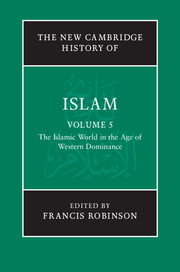Book contents
- Frontmatter
- Introduction
- PART I THE ONSET OF WESTERN DOMINATION C. 1800 TO C. 1919
- PART II INDEPENDENCE AND REVIVAL C. 1919 TO THE PRESENT
- 11 Turkey from the rise of Atatürk
- 12 West Asia from the First World War
- 13 Egypt from 1919
- 14 Sudan from 1919
- 15 North Africa from the First World War
- 16 Saudi Arabia, southern Arabia and the Gulf states from the First World War
- 17 Iran from 1919
- 18 Central Asia and the Caucasus from the First World War
- 19 Afghanistan from 1919
- 20 South Asia from 1919
- 21 South-East Asia from 1910
- 22 Africa south of the Sahara from the First World War
- 23 Islam in China from the First World War
- 24 Islam in the West
- Glossary
- Bibliography
- Index
- References
19 - Afghanistan from 1919
from PART II - INDEPENDENCE AND REVIVAL C. 1919 TO THE PRESENT
Published online by Cambridge University Press: 28 March 2011
- Frontmatter
- Introduction
- PART I THE ONSET OF WESTERN DOMINATION C. 1800 TO C. 1919
- PART II INDEPENDENCE AND REVIVAL C. 1919 TO THE PRESENT
- 11 Turkey from the rise of Atatürk
- 12 West Asia from the First World War
- 13 Egypt from 1919
- 14 Sudan from 1919
- 15 North Africa from the First World War
- 16 Saudi Arabia, southern Arabia and the Gulf states from the First World War
- 17 Iran from 1919
- 18 Central Asia and the Caucasus from the First World War
- 19 Afghanistan from 1919
- 20 South Asia from 1919
- 21 South-East Asia from 1910
- 22 Africa south of the Sahara from the First World War
- 23 Islam in China from the First World War
- 24 Islam in the West
- Glossary
- Bibliography
- Index
- References
Summary
The drive for independence and failed modernisation
The 1920s were marked by dramatic changes in leadership and policy. Amān Allāh, the third son of the assassinated Amīr Ḥabīb Allāh, challenged his uncle, Crown Prince Naṣr Allāh, for the throne. After seizing power (1919), he arrested Naṣr Allāh and some high officials, including General Muḥammad Nādir of the Muṣāḥibān family, on suspicion of involvement in the assassination. Naṣr Allāh died in jail, but members of the Muṣāḥibān family were quickly proclaimed innocent and given important government posts.
Amān Allāh had been raised in the tranquil palace surroundings with secular schooling and the nationalist sentiments and modernist outlook of his mentor, father-in-law and close adviser, Maḥmūd Ṭarzī. Unlike his predecessors, who claimed that God had chosen them to lead, he credited the ‘honorable nation of Afghanistan’ for putting the crown of the kingdom on his head.
Following a brief war (1919) he gained control of Afghanistan’s foreign affairs, hence independence, from British India. This bold act earned Amān Allāh the title of ghāzī (Muslim victor/hero), provided him with much-needed legitimacy and made him enormously popular within Afghanistan (however briefly) and beyond. He consolidated his power by promising salary rises to the army and creating state–clergy alliances. Once securely on the throne, Ghāzī Amīr Amān Allāh swapped his title of Amīr for Shāh Amān Allāh (King Amān-Allāh) and began to undertake sweeping but ill-fated legal, administrative, social and cultural reforms.
- Type
- Chapter
- Information
- The New Cambridge History of Islam , pp. 542 - 557Publisher: Cambridge University PressPrint publication year: 2010

